Asia Pulp & Paper hires its PR firm to do a hit job on Greenpeace but comes up short.
A new audit that seems to exonerate Asia Pulp & Paper from damaging logging practices in Indonesia was in fact conducted by the same people that are involved in its PR efforts, raising questions about the much maligned company’s commitment to cleaning up its operations.
The audit slams Greenpeace, the activist group that accused Asia Pulp & Paper (APP) of illegal and destructive logging in Sumatra in its July 2010 report, How Sinar Mas is Pulping the Planet (28 MB). It runs through each of the claims laid out in the Greenpeace report, arguing some are speculative or improperly cited. The audit notes discrepancies in concession maps and complains that Greenpeace cites habitat loss at the biggest threat to Sumatran tigers, while glossing over the biggest cause of mortality: poaching.
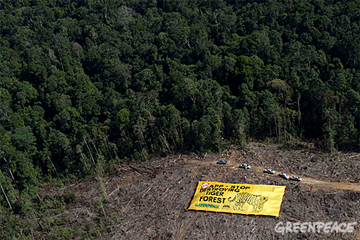 Greenpeace activists unfurl a giant banner “APP-Stop destroying Tiger Forests” to expose ongoing forest destruction by pulp giant Asia Pulp & Paper (APP). The banner was deployed in an area of active clearing by PT. Tebo Multi Agro (TMA), an affiliate of APP, on the southern part of the Bukit Tigapuluh landscape. Bukit Tigapuluh is one of the last refuges for the critically endangered Sumatran Tiger and hosts incredible biodiversity including 660 plant species, 200 species of birds and 60 mammal species, including the highly endangered clouded leopard, Malayan tapir, Sumatran elephant and the Orang utan. The area is also home to the indigenous peoples of the Orang Rimba and Talang Mamak. Photo and caption courtesy of Greenpeace. |
But the audit doesn’t actually deny that APP is clearing forests and peatlands for pulp plantations. In fact, the audit effectively confirms that the company is indeed engaged in conversion of ‘deep’ peat areas, but argues that this activity isn’t illegal under Indonesian law.
“The blanket illegality of the ‘three metre rule’ is therefore not clear-cut. The conditions of the decree permit any number of industrial activities within peatland areas, including mining, forestry and agriculture,” states the audit.
The audit also presents some clearly misleading claims. It says that Indonesia is not the world’s third largest greenhouse gas emitter, despite a report from the country’s National Climate Change Council (DNPI) showing that Indonesia trails only China and the United States in emissions. The audit tries to muddy the issue by mentioning per capita greenhouse gas emissions and emissions excluding land use, while citing other irrelevant data on Indonesia’s total forest. The audit suggests that the palm oil and pulp and paper industries are not major drivers of greenhouse gas emissions in Indonesia, while recent research has shown that more than half of oil palm expansion between 1990 and 2005 came at the expense of native forests in Indonesia, and that it, along with logging and timber plantations, are the biggest causes of forest conversion in the country.
But these points are relatively minor. The most puzzling piece of the story is why APP hired ITS Global, a firm that is owned by Alan Oxley, who also heads World Growth International, a group that lobbies on behalf of APP’s parent company Sinar Mas. ITS Global is by no means an independent auditor — it effectively does public relations for Sinar Mas. In other words, it has no credibility. Or as Greenpeace Indonesia’s Bustar Maitar puts it, “it’s a joke.”
World Growth International is perhaps best known for its breathless rants against various green groups (Greenpeace, the Rainforest Action Network, Friends of the Earth, and WWF-Indonesia are favorites), efforts to conserve forests and limit climate change (World Growth isn’t keen on the proposed REDD program but not for fears over corruption or disenfranchisement of local communities), and complaints about environmental transgressions by Sinar Mas holding companies (especially APP and palm oil producer Sinar Mas Agro Resources and Technology – SMART, which is a subsidiary of Golden Agri Resources, a Singapore-listed firm). Its reports have falsely claimed that oil palm plantations sequester more carbon than rainforests and that at present the leading cause of deforestation is subsistence agriculture, rather than enterprise-driven activities. World Growth reports have dismissed other important environmental concerns, including emissions from conversion of peatlands for plantations and loss of habitat for threatened species including orangutans and Sumatran tigers.
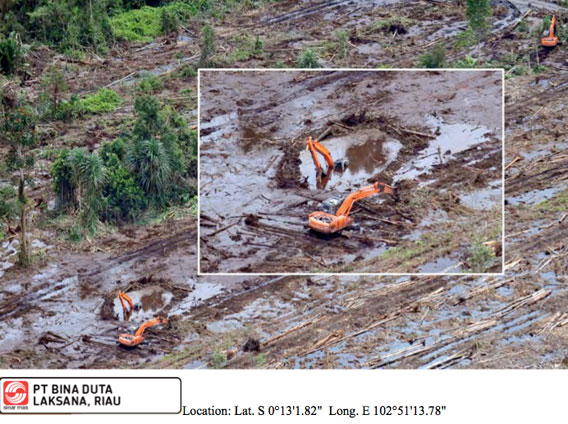 Further aerial monitoring by Greenpeace on 5 August 2010 of Kerumutan – an area of peatland in Riau, Sumatra that was highlighted in the report – presents additional compelling evidence of APP clearing deep peatland. Photo and caption from Greenpeace. |
In its audit, ITS Global engages in some of the same tactics it accuses Greenpeace of using. It faults Greenpeace for criticizing APP’s logging in the “Bukit Tigapuluh Forest Landscape” in Central Sumatra, noting that the area isn’t a protected area.
“The statement is also misleading because of the use of the term ‘Bukit Tigapuluh Forest Landscape’, which is a term that has no basis in law; it has been conflated with the Bukit Tigapuluh National Park by a number of campaign
groups including WWF,” says the audit, suggesting that Greenpeace’s use of the term is confusing the unprotected landscape with the protected area.
Yet World Growth frequently uses language to imply that Wangari Maathai, the 2004 Nobel Peace Prize winner for her tree-planting campaign in Africa, supports the large-scale conversion of tropical forests for industrial plantations to alleviate rural poverty. Maathai has not voiced support for such activities, which are against the spirit of her community-based Greenbelt Movement.
But these contradictions should be perhaps unsurprising given that ITS Global and World Growth is chaired by Oxley, the former Australian Ambassador to the GATT and a member of the Australian Government’s Foreign Affairs Council. Oxley previously served as a lobbyist for Rimbunan Hijau, a Malaysian logging firm that has been widely criticized for human rights abuses and destructive logging practices in Papua New Guinea. Oxley led a public relations campaign to portray Rimbunan Hijau as a responsible forestry company. He has also fought against efforts to limit greenhouse gas emissions (“There is no reasonable certainty that increases in atmospheric carbon dioxide from human activity cause significant global warming,” he wrote in a 2005 editorial) and slow tropical deforestation.
While APP and Sinar Mas may be hurting from the recent Greenpeace campaigns, which have helped cost the companies major clients including Unilever, Walmart, Kraft, Nestle, General Mills, Ricoh, Office Depot, Staples, Woolworths, and Burger King, among others, business looks to be booming for Oxley. The press release issued by ITS Global reads like an advertisement for the firm, touting its “research” and “communications strategies”, which are on full display in the latest audit.
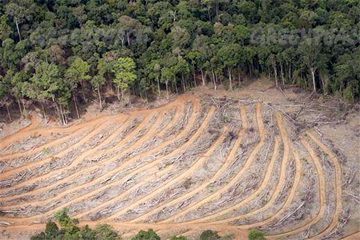 Photo courtesy of Greenpeace. |
Nevertheless all these shenanigans don’t really get to the root of the issue, which is that clearing of rainforests and peatlands in Indonesia is generally not illegal. In fact, one could argue it is encouraged. Forestry concessions are granted by the government (which had historically been heavily influenced through “special relations” with forestry companies) and, under current Indonesian law, must be exploited for a company to retain its rights to exploit the land. Therefore a company like Sinar Mas has substantial opportunities for legally converting biodiverse forests and carbon-dense peatlands into plantations, provided it secure the proper permits (which SMART failed to do in 8 of 11 oil palm plantations recently audited). Perhaps this is why the company, which as a major producer has substantial exposure to markets where environmental concerns are significant, chooses to continue with its increasingly ham-handed greenwashing campaigns (both APP and SMART stumbled into PR debacles last month in responding to Greenpeace charges). The unfortunate flip side of the coin is that no-name firms which sell exclusively into domestic markets or non-discerning overseas markets like India and China, don’t see the activist pressure, yet are probably even more damaging. But going after companies like Sinar Mas present the best opportunity for Greenpeace and other groups to push industries toward best environmental and social practices. The hope is that best practices will someday be codified into stronger laws for protecting the environment.
- NOTE 1: APP is actually a brand that sources products from several Indonesian companies but for the purposes of this post it will be treated as a company
- NOTE 2: Asia Pulp & Paper did not return request for comment from mongabay.com. A press conference with Alan Oxley and APP’s Aida Greenbury scheduled for this morning was called off by the organizers.
UPDATE Greenpeace has released a response to the ITS Global audit: Greenpeace Response to ITS Global Sept 2010
Related articles

(09/28/2010) Indonesia’s greenhouse gas emissions reached 2.1 billion tons of carbon dioxide in 2005, making it the world’s third largest emitter of greenhouse gases, but offering opportunities to substantially reduce emissions through forest conservation, reduced use of fire, protection of peatlands, and better forest management, reports a series of studies released earlier this month by the country’s National Climate Change Council (DNPI).
Eco-friendly palm oil initiative censures company linked to deforestation
(09/23/2010) The Roundtable On Sustainable Palm Oil (RSPO), a body the sets standards for eco-friendly palm oil production, on Thursday said Indonesian palm oil producer Sinar Mas Agro Resources and Technology (SMART) breached its sustainability criteria and faces expulsion, reports AFP.
Orangutans can survive in timber plantations, selectively logged forests
(09/23/2010) Selectively logged forests and timber plantations can serve as habitat for orangutans, suggesting that populations of the endangered ape may be more resilient than previously believed, reports research published in the journal PlosONE. The study, conducted by a team of researchers led by Erik Meijaard of Jakarta-based People and Nature Consulting International, found roughly equivalent population densities between natural forest areas and two pulp and paper plantation concessions in East Kalimantan, Indonesian Borneo.
Another food goliath falls to palm oil campaign

(09/22/2010) One of the world’s biggest food makers, General Mills, has pledged to source only sustainable and responsible palm oil within five years time. With this announcement, General Mills becomes only the most recent food giant to pledge to move away from problematic sources of palm oil, which is used in everything from processed foods to health and beauty products. Nestle made a similar pledge earlier this year after a brutalizing social media campaign that lasted for months while Unilever, the world’s biggest palm oil buyer, has been working closely with green groups for years.
Burger King drops palm oil supplier linked to Borneo rainforest destruction
(09/02/2010) Burger King announced it would no longer source palm oil from Sinar Mas, an Indonesian conglomerate, after an independent audit showed one of the company’s subsidiaries had destroyed rainforests and carbon-dense peatlands in Borneo and Sumatra, according to a statement on the fast food chain’s Facebook page.
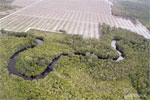
(08/19/2010) Sinar Mas, an Indonesian conglomerate whose holdings include Asia Pulp and Paper, a paper products brand, and PT Smart, a palm oil producer, was sharply rebuked Wednesday over a recent report where it claimed not to have engaged in destruction of forests and peatlands. At least one of its companies, Golden Agri Resources, may now face an investigation for deliberately misleading shareholders in its corporate filings.
How Greenpeace changes big business

(07/22/2010) Tropical deforestation claimed roughly 13 million hectares of forest per year during the first half of this decade, about the same rate of loss as the 1990s. But while the overall numbers have remained relatively constant, they mask a transition of great significance: a shift from poverty-driven to industry-driven deforestation and geographic consolidation of where deforestation occurs. These changes have important implications for efforts to protect the world’s remaining tropical forests in that environmental groups now have identifiable targets that may be more responsive to pressure on environmental concerns than tens of millions of impoverished rural farmers. In other words, activists have more leverage than ever to impact corporate behavior as it relates to deforestation. A prime example of this power is evident in a string of successful Greenpeace campaigns, which have targeted some of the largest drivers of deforestation, including the palm oil industry in Indonesia and Malaysia and the soy and cattle industries in the Brazilian Amazon. The campaigns have shared a common approach: target large, conspicuous consumer-facing companies that sell in western markets.
KFC, Walmart contributing to destruction of Indonesia’s rainforests, endangering orangutans
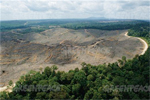
(07/05/2010) Major U.S. companies are contributing to the destruction of Indonesia’s rainforests by sourcing paper from Asia Pulp and Paper (APP), a subsidiary of Indonesia-based conglomerate Sinar Mas, alleges a new report from Greenpeace. Investigating two sites on the Indonesian island of Sumatra, the activist group documented destruction of rainforests and carbon-dense peatlands by APP, a company that has lost several major contacts in recent years due to its poor environmental record. Greenpeace called out Walmart, Auchan, and Kentucky Fried Chicken (KFC) as companies that continue to buy from APP despite its role in deforestation and peatlands degradation.
Nestle caves to activist pressure on palm oil

(05/17/2010) After a two month campaign against Nestle for its use of palm oil linked to rainforest destruction spearheaded by Greenpeace, the food giant has given in to activists’ demands. The Swiss-based company announced today in Malaysia that it will partner with the Forest Trust, an international non-profit organization, to rid its supply chain of any sources involved in the destruction of rainforests. “Nestle’s actions will focus on the systematic identification and exclusion of companies owning or managing high risk plantations or farms linked to deforestation,” a press release from the company reads, adding that “Nestle wants to ensure that its products have no deforestation footprint.”
Certified sustainable palm oil sales reach record level
(04/09/2010) Sales of palm oil certified under the green criteria set by the Roundtable on Sustainable Palm Oil (RSPO) reached a record high in March, climbing nearly 8 percent over February 2010 to 136,000 metric tons, reports the RSPO in its monthly bulletin.
Nestle’s palm oil debacle highlights current limitations of certification scheme
(03/26/2010) Last week Nestle, the world’s largest food processor, was caught in a firestorm when it attempted to censor a Greenpeace campaign that targeted its use of palm oil sourced from a supplier accused of environmentally-damaging practices. The incident brought the increasingly raucous debate over palm oil into the spotlight and renewed questions over an industry-backed certification scheme that aims to improve the crop’s environmental performance.
A new world?: Social media protest against Nestle may have longstanding ramifications

(03/20/2010) The online protest over Nestle’s use of palm oil linked to deforestation in Indonesia continues unabated over the weekend. One only needed to check-in on the Nestle’s Facebook fan page to see that anger and frustration over the company’s palm oil sourcing policies, as well as its attempts to censor a Greenpeace video (and comments online), has sparked a social media protest that is noteworthy for its vehemence, its length, and its bringing to light the issue of palm oil and deforestation to a broader public.
Changing drivers of deforestation provide new opportunities for conservation

(12/09/2009) Tropical deforestation claimed roughly 13 million hectares of forest per year during the first half of this decade, about the same rate of loss as the 1990s. But while the overall numbers have remained relatively constant, they mask a transition of great significance: a shift from poverty-driven to industry-driven deforestation and geographic consolidation of where deforestation occurs. These changes have important implications for efforts to protect the world’s remaining tropical forests in that environmental lobby groups now have identifiable targets that may be more responsive to pressure on environmental concerns than tens of millions of impoverished rural farmers. In other words, activists have more leverage than ever to impact corporate behavior as it relates to deforestation.
Shift from poverty-driven to industry-driven deforestation may help conservation
(08/06/2008) A shift from poverty-driven deforestation to industry-driven deforestation in the tropics may offer new opportunities for forest conservation, argues a new paper published in the journal Trends in Evolution & Ecology.